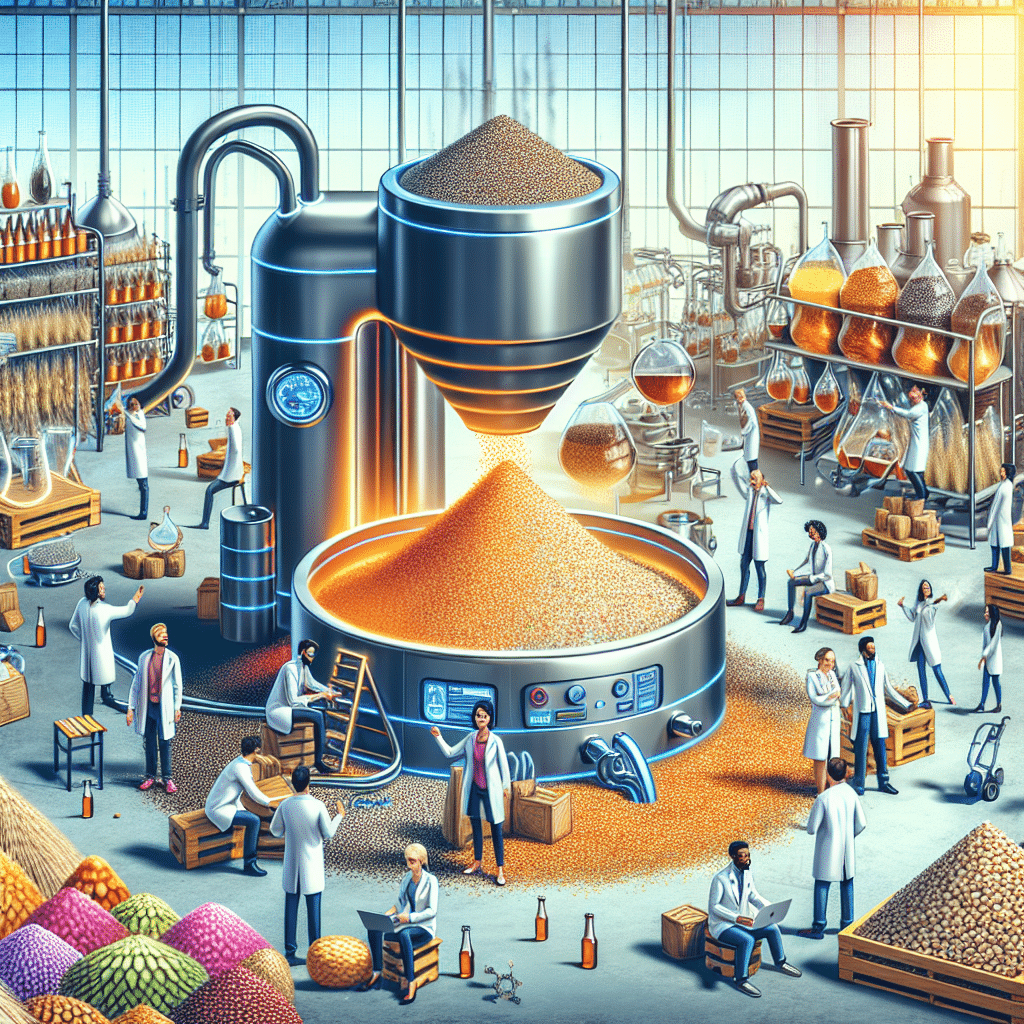Beer Brewing’s Future: Malt Alternatives’ Growing Influence
-
Table of Contents
- Beer Brewing’s Future: The Rise of Malt Alternatives
- The Traditional Role of Malt in Beer Brewing
- Environmental and Health Drivers for Change
- Emerging Malt Alternatives in Beer Brewing
- Case Studies: Pioneers of Malt Alternative Brewing
- Technological Advances Supporting Malt Alternatives
- The Impact on Beer Flavor and Diversity
- Challenges and Considerations for Brewers
- Conclusion: Embracing the Future of Beer Brewing
- Discover ETprotein’s Protein Products for Brewing
Beer Brewing’s Future: The Rise of Malt Alternatives

The craft of beer brewing has been evolving for thousands of years, with each era bringing its own innovations and styles. Today, we stand on the cusp of a new revolution within the industry, one that is driven by sustainability, health consciousness, and the pursuit of unique flavors. Malt, the traditional backbone of beer, is being reimagined as brewers explore alternative grains and substances to create their libations. This article delves into the growing influence of malt alternatives in beer brewing and what it means for the future of this beloved beverage.
The Traditional Role of Malt in Beer Brewing
Malt has long been the soul of beer, providing the essential sugars needed for fermentation as well as contributing to the flavor, color, and body of the final product. Typically made from barley, malt is created through a process of soaking, germinating, and drying the grains. However, as the beer industry progresses, the limitations of traditional malt, such as environmental concerns and the desire for gluten-free options, have paved the way for innovative alternatives.
Environmental and Health Drivers for Change
Two of the most significant factors influencing the shift towards malt alternatives are environmental sustainability and health considerations. The production of traditional malt requires significant water and energy resources, and as the effects of climate change become more pronounced, the industry is seeking more eco-friendly options. Additionally, the rise in consumer demand for gluten-free and lower-calorie beers has brewers experimenting with different grains and adjuncts.
Emerging Malt Alternatives in Beer Brewing
As brewers look to address these concerns, a variety of malt alternatives have begun to emerge, each offering unique benefits and challenges:
- Sorghum: A gluten-free grain that is drought-resistant, making it an environmentally friendly option.
- Rice: Offers a lighter body and flavor, and is also gluten-free.
- Corn: Provides a mild, sweet flavor and is often used in lighter lagers.
- Oats: Contribute to a smooth mouthfeel and are favored in styles like oatmeal stouts.
- Rye: Adds a spicy note to beer and can enhance mouthfeel.
- Millet and Buckwheat: Gluten-free options that offer a variety of flavors and are gaining popularity in craft brewing.
Each of these alternatives not only addresses specific consumer demands but also opens up new possibilities for flavor profiles and beer styles.
Case Studies: Pioneers of Malt Alternative Brewing
Several breweries have already made a name for themselves by pioneering the use of malt alternatives. For instance, Ghostfish Brewing Company has become a leader in gluten-free beer, utilizing grains like millet, buckwheat, and brown rice. Their award-winning beers have shown that malt alternatives can compete with traditional barley-based brews in both taste and quality.
Another example is Dogfish Head Craft Brewery, which has experimented with ancient grains and even non-grain fermentables like fruit and honey. Their continual push for innovation has resulted in unique beers that challenge the conventional understanding of what beer can be.
Technological Advances Supporting Malt Alternatives
Advancements in brewing technology have also played a crucial role in the rise of malt alternatives. Modern malting techniques have made it easier to process alternative grains, while developments in enzymology allow brewers to better control the fermentation process. This has led to more consistent and higher quality beers made from non-traditional ingredients.
The Impact on Beer Flavor and Diversity
The incorporation of malt alternatives is not just a response to external pressures; it’s also a way to expand the flavor palette of beer. These new ingredients can introduce flavors ranging from earthy to nutty, sweet to spicy, thereby increasing the diversity of beer styles available to consumers. This innovation is particularly exciting for craft brewers, who are always seeking to differentiate their products in a crowded market.
Challenges and Considerations for Brewers
Despite the potential benefits, there are challenges associated with using malt alternatives. These include:
- Ensuring consistent quality and flavor profiles with less predictable ingredients.
- Adapting brewing equipment and processes designed for traditional malt.
- Navigating regulatory environments that may have strict definitions of what constitutes beer.
- Educating consumers about the benefits and characteristics of beers made with alternative ingredients.
Brewers must carefully consider these factors as they explore the use of malt alternatives in their beer production.
Conclusion: Embracing the Future of Beer Brewing
The future of beer brewing is one of innovation and adaptation. As malt alternatives continue to grow in influence, they offer brewers the opportunity to create more sustainable, health-conscious, and diverse beers. While challenges remain, the potential for these new ingredients to reshape the industry is immense. By embracing these changes, brewers can ensure that beer remains a dynamic and evolving beverage for generations to come.
Discover ETprotein’s Protein Products for Brewing
In line with the innovative spirit of using malt alternatives, ETprotein offers a range of protein products that can complement the brewing process. Their organic bulk vegan proteins, such as rice and pea proteins, can be used to enhance the nutritional profile of beers without compromising on taste or quality. With a commitment to non-GMO and allergen-free ingredients, ETprotein’s products are an excellent choice for forward-thinking breweries looking to cater to health-conscious consumers.
About ETprotein:
ETprotein, a reputable protein and L-(+)-Ergothioneine (EGT) Chinese factory manufacturer and supplier, is renowned for producing, stocking, exporting, and delivering the highest quality organic bulk vegan proteins and L-(+)-Ergothioneine. They include Organic rice protein, clear rice protein, pea protein, clear pea protein, watermelon seed protein, pumpkin seed protein, sunflower seed protein, mung bean protein, peanut protein, and L-(+)-Ergothioneine EGT Pharmaceutical grade, L-(+)-Ergothioneine EGT food grade, L-(+)-Ergothioneine EGT cosmetic grade, L-(+)-Ergothioneine EGT reference grade and L-(+)-Ergothioneine EGT standard. Their offerings, characterized by a neutral taste, non-GMO, allergen-free attributes, with L-(+)-Ergothioneine purity over 98%, 99%, cater to a diverse range of industries. They serve nutraceutical, pharmaceutical, cosmeceutical, veterinary, as well as food and beverage finished product distributors, traders, and manufacturers across Europe, USA, Canada, Australia, Thailand, Japan, Korea, Brazil, and Chile, among others.
ETprotein specialization includes exporting and delivering tailor-made protein powder and finished nutritional supplements. Their extensive product range covers sectors like Food and Beverage, Sports Nutrition, Weight Management, Dietary Supplements, Health and Wellness Products, and Infant Formula, ensuring comprehensive solutions to meet all your protein needs.
As a trusted company by leading global food and beverage brands and Fortune 500 companies, ETprotein reinforces China’s reputation in the global arena. For more information or to sample their products, please contact them and email sales(at)ETprotein.com today.














